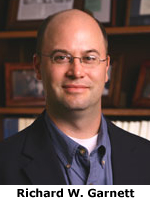
The U.S. Supreme Court should uphold the federal Partial Birth Abortion Ban Act of 2003, according to Richard W. Garnett, Lilly Associate Professor of Law in theNotre DameLawSchool.
On Wednesday (Nov. 8), the Supreme Court will hear arguments in two cases, Gonzales vs. Carhart andGonzales vs. Planned Parenthood, concerning the constitutionality of a federal law banning a midterm abortion procedure that opponents call partial-birth abortion.
For as long as Americans have known about partial-birth abortion,Garnett said,they have—by comfortable and consistent margins—agreed with the late Sen. Daniel Patrick Moynihan that it is infanticide,and that one would be too many.Nothing in our constitutional text, history, tradition, or structure supports, let alone compels, the conclusion that the American people may not affirm our commitment to decency and human dignity by rejecting partial-birth abortion.
Garnett was co-author of an amicus curiae brief, filed on behalf of the Christian Legal Society and other pro-life organizations, urging the Supreme Court to affirm the constitutionality of the federal ban.In the brief, Garnett argues that respect for precedent, and for principles ofstare decisis,should not prevent the justices from upholding the ban or from overturning a previous decision in 2000 which struck down a similar ban in the state ofNebraska.
It is eminently sensible,Garnett argues,for courts to stick with settled decisions, absent special and strong justification.But the doctrine of stare decisis, properly understood, is not an inexorable command of blind, unquestioning adherence to the most recently decided case.It is, instead, a principle of judicial policy, a flexible,practical idea that leaves plenty of room for discretion as to how it should be applied in any given set of circumstances.
Garnett may be contacted at 574-631-6981 or Garnett.4@nd.edu .
TopicID: 19962